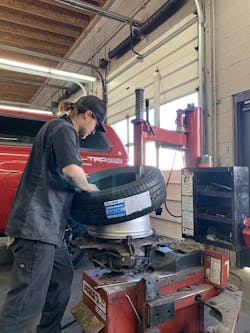With some time left in the current winter season, dealers have already placed their winter tire orders for the next one.
We recently talked with three tire dealers about the differing conditions in their markets and found that each one is forging a unique path to winter tire profitability.
Education is key
In Great Falls, Mont., Ken Noble and his team at Superior Tire Inc. are educating a new crop of customers about the benefits of winter tires.
As remote work has become the norm due to the COVID19 pandemic, the central Montana community of Great Falls has become attractive to workers on the move. Superior Tire’s consumer tire sales are growing as more people relocate to the area. And that is reflected in the dealership’s mix of products.
Historically, the single-store operation has been heavily focused on commercial and farm tires. Those products are still important, as Great Falls remains a farming community. But Noble says the company’s tire sales mix has changed to 55% commercial and 45% consumer.
On the consumer tire side, some of that growth has come from new residents who aren’t accustomed to winter driving conditions.
“When we’re talking to people — especially new customers — we ask how they drive, where they drive and what they drive,” says Noble, who has been in business since 2000.
“We try to determine how they use their vehicles to get the right tire for their application.”
Though Montana allows the use of studded tires from October through May, Noble says he sells mostly studless winter tires. When he does sell a studded winter tire, it’s because the customer specifically asked for it.
Noble says he’s added another product to his winter tire sales conversations — the all-weather tire.
“In the last four or five years, we’ve really marketed the all-weather tire. It works extremely well in this part of the country. We started with the Toyo Celsius.”
Noble says the all-weather product, which is Superior Tire’s most popular passenger tire, is a good match for the fickle winter weather in his area. The dealership also sells the Nokian WR G4 all-weather tire.
Explaining the features and benefits of winter and all-weather tires is important, says Noble. And those explanations work outside of the winter tire selling season and extend to other tires, as well.
Noble says he stocks about $1 million worth of tires and in the last couple of years, Superior Tire has been turning its inventory at least four times a year. Business is so brisk that “I could add stores in some outlying communities. I could start three stores and be profitable overnight, but I don’t have the people.
“There are two towns I’d love to expand to, but I will not until I have the people” to staff them. “I can’t bring myself to open a store and not offer the quality service that I expect.”
Noble says he used to operate with a crew of 12 people.
“Now I have four and our business has increased 30%.”
Superior Tire’s wages have tripled to ensure that its employees don’t leave.
“The guys haven’t had a lunch break in two years,” he says. “Fortunately, I’ve got four people who are willing to do that and are capable of that, which has been a blessing.”
Changes in Maine
The winter tire selling season isn’t what it used to be for brothers Don and Mike Foshay, the president and vice president, respectively, of Don Foshay’s Discount Tire & Alignment, a six-store retail business in Maine, and Summit of New England, a wholesale business that serves customers in four states.
They’ve both spent more than 30 years in the business that their father, Don Foshay Sr., started in 1982.
“When Mike and I were first in this business, we sold a lot of snow tires — even going back as far as retreaded snow tires,” says Don Jr.
“We used to bring in a very sizable inventory of retreaded snow tires. As the technology has gotten better with the design of all-terrain and all-season products — and also (as) the design’s gotten better with all-wheel-drive automobiles,” local demand for winter tires has declined.
“We’re still very, very busy in that fourth quarter. It’s a lot of units — just not a lot of snow units.”
Still, Mike says Summit of New England ordered about 10,000 winter tires for the season. The wholesale business serves the Foshay family’s retail stores, as well as other independent tire dealerships and some car dealerships.
One thing winter tires need to have is the ability to add studs.
“We are 80% studded and 20% studless,” says Don Jr. “When we’re shopping for snow tires for the next year, having a studdable product is an absolute must for us to take on a product line.”
Falken and Cooper brand products make up most of the Foshays’ winter tire lineup. Thirty-five years ago, they established a relationship with Cooper Tire & Rubber Co. (Their retail stores are heavily branded with the Cooper name.)
“As our (winter) inventory winds down with Cooper, we’ll fill in whatever we can get for the retail stores,” says Don Jr.
“The intention on the wholesale (side) is to run out of product so you’re not carrying product forward.”
Supply chain issues have prompted the Foshays to increase their overall wholesale inventory. But there was an exception this season. They ordered the same number of winter tires as they have in the past.
Meanwhile, sales of other units increased. If the Foshays had increased winter units, too, Don Jr. says, “I would be storing tires on the roof. Fill rates have caused us to really bump up our inventory, which reduces our turns — which obviously reduces your profitability
Success with storage
Nearly 2,500 miles to the west of Maine, in Woods Cross, Utah, Casey Gubler says winter weather isn’t like what he remembers from his childhood.
And those changes are affecting winter tire sales at Woods Cross Point S, the retail store he owns with his father.
“Winters have changed with global warming. We’re not getting as much snow at times. When I was a kid, you’d look at the Great Salt Lake and it was a lot bigger and it had more water in it. It’s definitely shrunken up in my lifetime.”
Three-day snowstorms are mostly a thing of the past, he says. Now, clearing snow requires a shovel more than a snowblower and Gubler says fewer people are committing to winter tires.
“That’s been the toss-up for people — should they buy snow tires? They know what (winter tires) do. They know they need them, but (the question is), are they going to need them this year?”
And with higher tire prices, Gubler says plenty of consumers are willing to push the envelope.
But he’s still made investments to lock in winter tire customers.
Woods Cross Point S is a single-store dealership, but it’s grown to encompass a small campus of three adjacent buildings. The company’s main property has 10 service bays. A building behind it houses an alignment bay, plus one more lift.
The company recently expanded into a climate-controlled, 40,000-square-foot building next door. Gubler knocked through a wall to install an 18-foot-by-18-foot garage door. One small piece of that building’s use is seasonal tire storage for customers. There are also seven more vehicle lifts inside.
Seasonal tire customers start arriving around Halloween for their winter tire installs. Gubler charges $50 for each season of storage — $100 for a full year. He charges for tire installation and any related tire pressure monitoring system service.
“I have 75 sets that I store for people” who lack their own space.
“For them, it’s a no-brainer. We have dedicated racks. We tag (the tires,) store them and make a small income doing that.”
Gubler says his family’s dealership has been in different spaces over the years. In other locations, they had no space to offer seasonal tire storage.
“When people would ask, I’d have to say no because I’d just be tripping over them.” Adding a third building opened up that opportunity.
“It’s really evolved,” he says. “Every year we’re storing more and more. We have the space to accommodate.”
And he’s not just talking about winter tires.
Woods Cross Point S is marketing space as weatherized storage for recreational vehicles. They store boats, off-road vehicles and campers. The price for storage depends on how much space a vehicle requires.
“It’s just another way to set myself apart from my competitors and another way to make a profit. We’re in our second year of doing that.”
The vehicle storage business helps his tire and automotive business, too.
“Everyone who boats has friends with boats. A lot of people (have partner owners) with boats and one partner is our customer” and the other isn’t.
“He brings his friend to me and we have a chance to help him and their vehicles. It’s another way to earn a new customer.”
Gubler says most of those boat owners have four or five cars at home. “They see what we’ve built and what we’re trying to create. We try to keep a really nice facility and keep up with new technology and new equipment.”
About the Author
Joy Kopcha
Managing Editor
Joy Kopcha joined Modern Tire Dealer and Auto Service Professional as senior editor in 2014 after working as a newspaper reporter for a dozen years in Kansas, Indiana and Pennsylvania. She was named managing editor of MTD and ASP in 2022, and took on that same role with Motor Age in 2024.
She is an award-winning journalist, including in 2023 when she was named a Jesse H. Neal Awards Finalist.
Don't miss any of her articles. Sign up for MTD's newsletters.

